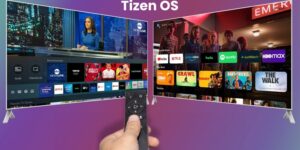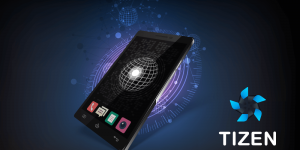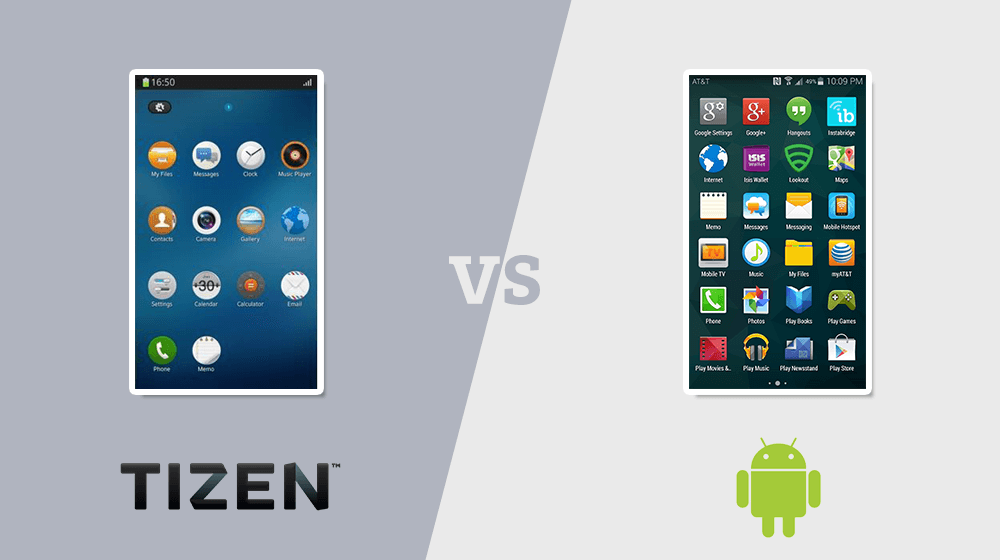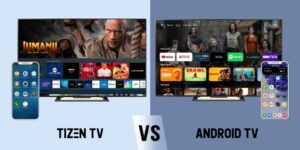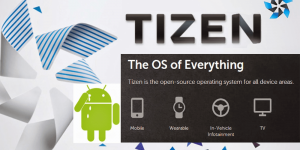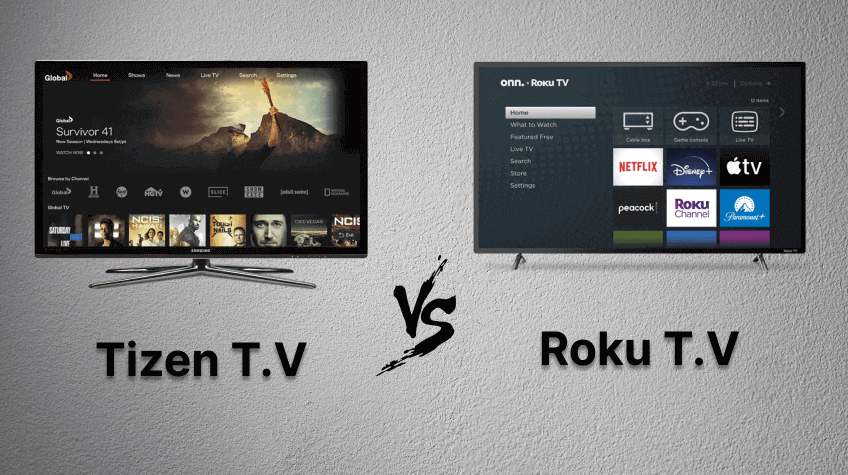
Regarding the best smart TV, two of the most popular choices are Tizen and Roku. Both offer an exceptional user experience with various functions that set them apart from competitors. However, when looking at both TVs side-by-side, some variations between them might influence your decision on which one is better suited for you.
In this article, we will compare Tizen TV Vs. Roku TV: Which is better to help you understand why each stands above the rest and identify the reasons behind its popularity among consumers so that you can choose what’s best suitable for your needs.
What is Tizen TV
Tizen is the latest technology to hit the market, revolutionizing home entertainment. It’s a new open-source operating system developed by Samsung that unifies various streaming services from different platforms into one single platform – bringing you the best of both worlds. With its intuitive user interface and advanced features, including interactive search & recommendation, voice control compatibility with Bixby*, 4K UHD resolution support (up to 8M), content personalization tools like Smart Hub Screen Mirroring, Tizen TVs promise a truly immersive viewing experience for all users.
Whether watching movies on your large screen or playing games in your living room, it enhances visual quality with HDR10+™ standards – allowing you to get lost in vivid colors at any angle! And this isn’t even touching upon how easy it makes accessing apps like Netflix or Youtube across multiple devices without having to switch inputs constantly–making life just a bit more convenient when trying out new shows every day.
What is Roku TV
Roku TV is a smart platform developed by Roku, Inc. and used by several television manufacturers, including TCL, Hisense, and Sharp. It provides users a unified interface across different TV brands, offering a seamless and user-friendly experience.
Roku TV has a vast channel store that offers thousands of apps and streaming services, including popular ones like Netflix, Hulu, and Disney+. It is known for its simple setup process, affordability, and support for various streaming resolutions, including 4K and HDR. Roku TV allows users to easily access a wide range of entertainment options and enjoy their favorite content.
Comparison Between Tizen vs. Roku
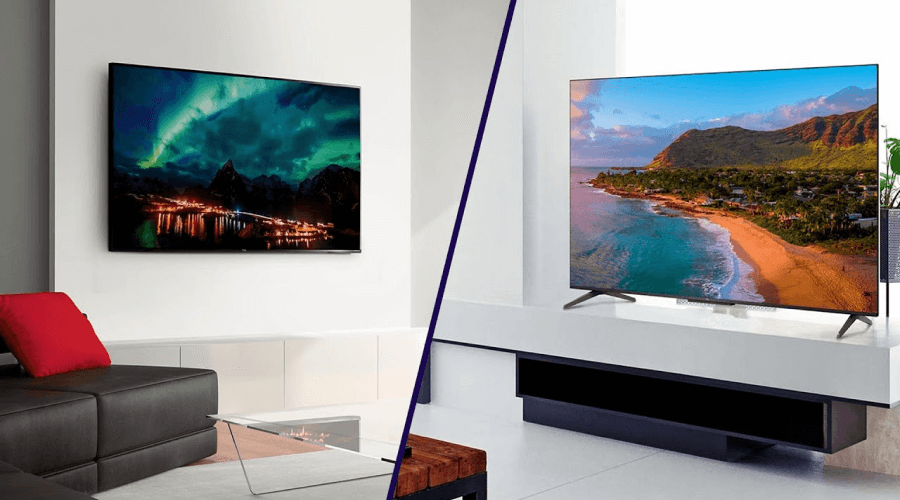
Here’s a comparison of the user interface in Tizen and Roku TV
Tizen User Interface
- User-friendly and intuitive interface
- Attractive design and layout
- Smooth navigation and menu organization
- Offers customizable home screen with app shortcuts and content recommendations
- Ensures consistency and visual appeal across Samsung Smart TVs
- Supports gestures and motion controls for specific interactions
- Features a multitasking interface for running multiple apps simultaneously
Roku TV User Interface
- Simple interface
- Clean and minimalist design
- Easy navigation with a horizontal menu bar
- Offers a grid-like home screen displaying installed channels and apps
- Provides customizable home screen with favorite channels and personalized recommendations
- Rearrange and organize channels based on their preferences
- Features a universal search function for finding content across multiple apps
Please note that the user interface experience can vary depending on each platform’s specific TV model and software version.
Apps available
Here are some examples of popular apps available on Tizen and Roku TV:
Tizen Apps
- Netflix
- Amazon Prime Video
- Hulu
- Disney+
- YouTube
- Apple TV
- Spotify
- Twitch
- HBO Max
- ESPN
- BBC iPlayer
- Vudu
- Plex
- Twitch
- Kodi
Roku TV Apps
- Netflix
- Amazon Prime Video
- Hulu
- Disney+
- YouTube
- Apple TV
- Spotify
- HBO Max
- ESPN
- BBC iPlayer
- Vudu
- Plex
- Twitch
- Pandora
- Sling TV
These are just a few examples, and both Tizen and Roku TV platforms offer a wide range of apps and streaming services. App availability may vary by region and TV model you have. It’s always a good idea to check the respective app stores or consult the manufacturer’s website for an up-to-date list of available apps.
RELATED: Devices that are Supported and Compatible with Tizen
Video
Here’s a comparison of video quality features in Tizen and Roku TV
Tizen
- Supports various video resolutions, including Full HD (1080p) and Ultra HD (4K).
- Offers HDR (High Dynamic Range) support for enhanced color and contrast in compatible content.
- Supports advanced HDR formats like HDR10+ and Dolby Vision for an optimized viewing experience.
- It provides upscaling capabilities to improve the quality of lower-resolution content.
- Offers smooth video playback with minimal buffering and high-quality streaming performance.
Roku TV
- Supports a range of video resolutions, including Full HD (1080p) and Ultra HD (4K).
- Offers HDR (High Dynamic Range) support for improved color and contrast in compatible content.
- Provides automatic resolution and frame rate adjustment based on the capabilities of the TV and the content being played.
- Backs widespread HDR formats like HDR10 and HLG (Hybrid Log-Gamma).
- Offers smooth streaming performance and reliable video playback.
Tizen and Roku TV platforms strive to provide high-quality video playback, including support for higher resolutions and HDR content. The actual video quality experienced may also depend on factors such as the TV model, internet connection speed, and the quality of the content being streamed or played.
Audio
Here’s a comparison of audio features in Tizen and Roku TV
Tizen
- Supports various audio formats, including popular ones like Dolby Digital and DTS.
- Offers support for advanced audio technologies like Dolby Atmos and DTS:X for immersive audio experiences (depending on the TV model and content availability).
- It provides options for audio customization, including equalizer settings and audio presets.
- It supports audio passthrough, allowing the TV to pass signals to external audio systems or soundbars.
- Provides numerous audio output options, including HDMI ARC, optical audio, and Bluetooth connectivity for wireless audio devices.
Roku TV
- Supports various audio formats, including Dolby Digital and DTS.
- Offers a range of audio settings, including volume leveling and audio modes (such as Movie, Music, and Night modes).
- Provides support for virtual surround sound technologies, enhancing the audio experience without additional speakers.
- Provides a variety of audio output options, including HDMI ARC, optical audio, and headphone jack.
- Supports Bluetooth connectivity for wireless headphones and speaker devices.
Tizen and Roku TV platforms aim to deliver high-quality audio experiences, including support for popular audio formats and customizable audio settings. The availability and range of audio features may vary depending on the TV model and its audio capabilities.
Also See: Tizen vs Android: Which is better?
Voice Control
Here’s a comparison of voice control features in Tizen and Roku TV
Tizen Voice Control
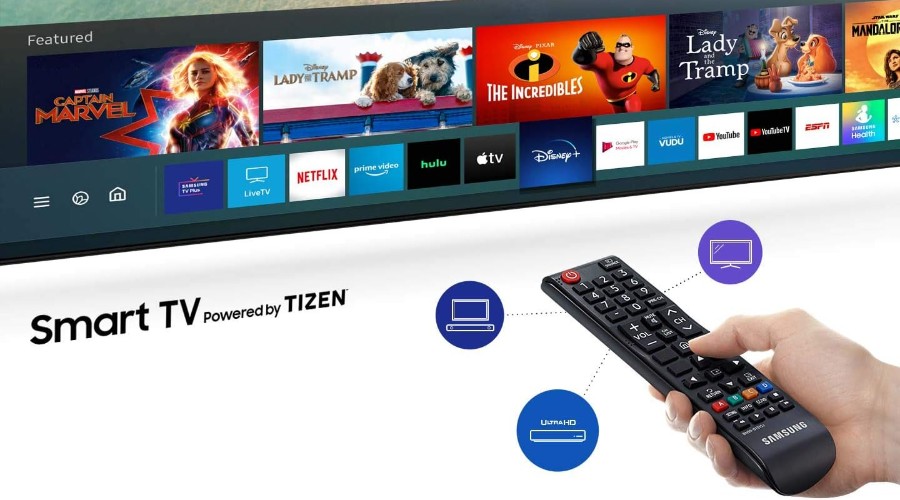
- Offers voice control capabilities through the built-in voice assistant, Bixby.
- Change channels, adjust volume, and launch apps using voice commands.
- Supports natural language processing for more conversational voice interactions.
- Provides voice search functionality to find specific content or apps quickly.
- Offers integration with other Samsung devices for seamless voice control across the ecosystem.
- Provides hands-free command of the TV using voice commands.
Roku TV Voice Control
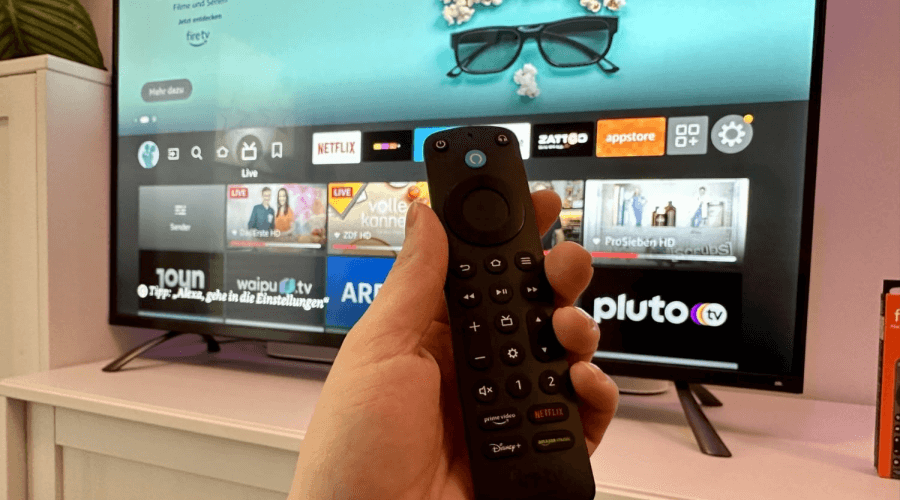
- Offers voice control through the Roku Voice Assistant or compatible voice-enabled remote controls.
- Allows users to control TV functions, launch apps, search for content, and navigate menus using voice commands.
- Supports natural language processing for intuitive voice interactions.
- It provides voice search functionality to find movies, shows, actors, or genres quickly.
- Offers integration with popular voice assistants like Google Assistant or Amazon Alexa for expanded voice control options.
- Enables hands-free control using voice commands through compatible smart speakers or devices.
It’s important to note that the availability and performance of voice control features may vary depending on the specific TV model and the region in which it is used.
Differences between Tizen and Roku TV
Here are the critical differences between Tizen and Roku TV
Tizen
- Developed by Samsung for their Smart TVs.
- User interface designed for seamless integration with Samsung devices and SmartThings ecosystem.
- Supports voice control with Bixby integration.
- Offers additional features like screen mirroring and multitasking.
- Extensive app and service support.
- Ideal for users invested in the Samsung ecosystem and seeking advanced integration options.
Roku TV
- Developed by Roku and used by various TV manufacturers.
- Provides a unified interface across different TV brands.
- Provides access to a wide range of apps and channels.
- The simple setup process and affordability.
- Supports different streaming resolutions, including 4K and HDR.
- Suitable for users looking for a straightforward and customizable smart TV experience.
These differences highlight the unique strengths and focus areas of each platform. It’s essential to evaluate your precise requirements and preferences when deciding between Tizen and Roku.
Which is better
Determining which platform is better, Tizen or Roku TV ultimately depends on individual preferences and specific needs. The following are some key factors to consider
Tizen
- User-friendly interface with smooth navigation.
- Extensive app and service support.
- Seamless integration with other Samsung devices and the SmartThings ecosystem.
- Voice control capabilities with Bixby integration.
- Additional features like screen mirroring and multitasking.
- Ideal for users who prefer a Samsung ecosystem and advanced integration options.
Roku TV
- Straightforward interface.
- Wide range of app and channel options.
- Compatibility with various TV brands.
- The easy setup process and affordability.
- Support for different streaming resolutions.
- Suitable for users seeking a straightforward and customizable smart TV experience.
Remember, the “better” option depends on personal preferences, desired features, and compatibility with other devices. It’s recommended to evaluate individual needs and priorities when deciding between Tizen and Roku TV.
In conclusion, Tizen and Roku TV are popular smart TV platforms, each with unique features and strengths. Tizen, developed by Samsung, offers seamless integration with other Samsung devices, a user-friendly interface, and advanced features like screen mirroring and multitasking.
On the other hand, Roku TV provides a unified interface across various TV brands, extensive app, and channel support, and a simple setup process at an affordable price. The choice between Tizen and Roku TV ultimately depends on individual preferences, desired features, and compatibility with other devices. These aspects will support you in making an informed decision and enjoy a personalized smart TV experience. We hope this blog Tizen TV Vs. Roku TV is useful for readers.

